Need an Alternative for Cooking Spray? Try These 3 Easy Swaps
Using an alternative to cooking spray is better for your nonstick pans, not to mention the environment. Here are three substitutes we recommend.
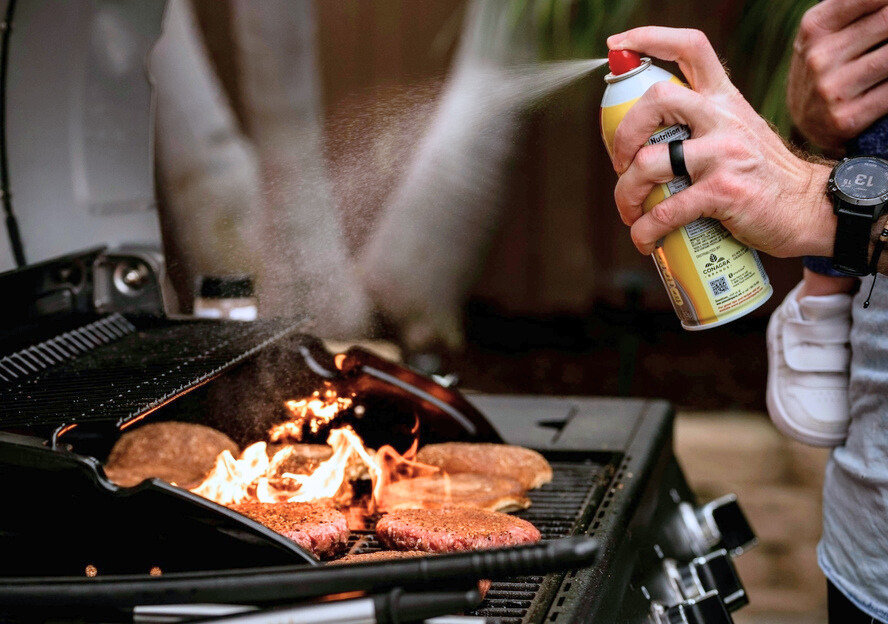
Nonstick cooking spray might seem like your kitchen’s secret weapon, but it’s not all it’s cracked up to be. It promises easy cleanup and perfectly cooked meals, but sometimes it brings more drama than a reality TV show. Plus, you’ve spent all that time researching clean cookware options (or if you haven’t, check out our top picks!) — why cook with something that’s literally ruining your nonstick cookware?
From mysterious residues to sneaky chemicals, let’s uncover what’s really going on with this seemingly harmless kitchen spray — and what you can use as an alternative for cooking spray that won’t destroy your pans.
What’s Wrong With Nonstick Cooking Oil Spray?
Before we cover the best substitutes for cooking spray, it’s worth understanding exactly why you should avoid these cans at the supermarket.
Not Just Oil
Inside that aerosol can of nonstick spray is a giant list of ingredients, including emulsifiers like lecithin, anti-foaming agents like dimethyl silicone, and even gasses like propane and butane that are added as propellants. In a world where it’s already too easy to unknowingly ingest dangerous chemicals, who wants all of these additional mystery ingredients going into their food?! Not us.
Want more tips on clean cookware? Sign up for the newsletter for more well-researched, non-toxic living guidance and smart wellness advice.
Cooking Sprays Destroy Nonstick Coatings
So you’ve done your research and finally bought an amazing, fancy new set of nonstick cookware after reading our rave review about GreenPan. (Or maybe you’re more of a Caraway Cookware gal? You can’t go wrong either way.) But you’ve cooked a couple of meals with nonstick cooking oil spray and now your new pan is covered in sticky, built-up goo. What’s going on?
When you use cooking spray, the additives will build up on your cookware over time, causing thick layers of grease and scum to develop in your pans. Cooking sprays burn at a lower temperature, so they’ll also degrade the surface or coating of your nonstick skillet. In the long run, this actually makes food adhere more to the pan and is the opposite of what you want.
The same thing can happen to other cookware options without a coating — cooking sprays will slowly build up and degrade stainless steel, cast iron, carbon steel, and ceramic cookware, too.
What to Use Instead of Nonstick Spray
If you’re panicking about losing your nonstick cooking oil spray, take a deep breath. There are plenty of ways to skip the can of nonstick spray and save your cookware. The first thing to do is to stop spraying those pans immediately before your cookware manufacturer voids the pan warranty (yes, they sometimes do that if you use cooking spray!), and you’re left with a greasy, damaged pan. The next step is to find the cooking spray substitute that works best for you.
Olive Oil as An Alternative for Cooking Spray
Greasing a pan with olive oil is a fantastic substitute for cooking spray, offering both health and flavor benefits. Unlike aerosol sprays, olive oil is a natural and heart-healthy fat, rich in antioxidants and healthy monounsaturated fats.1 It not only prevents your food from sticking to your cookware, but it also adds a subtle, delicious flavor to your dishes. Olive oil goes well with everything, from chicken to veggies to cakes!
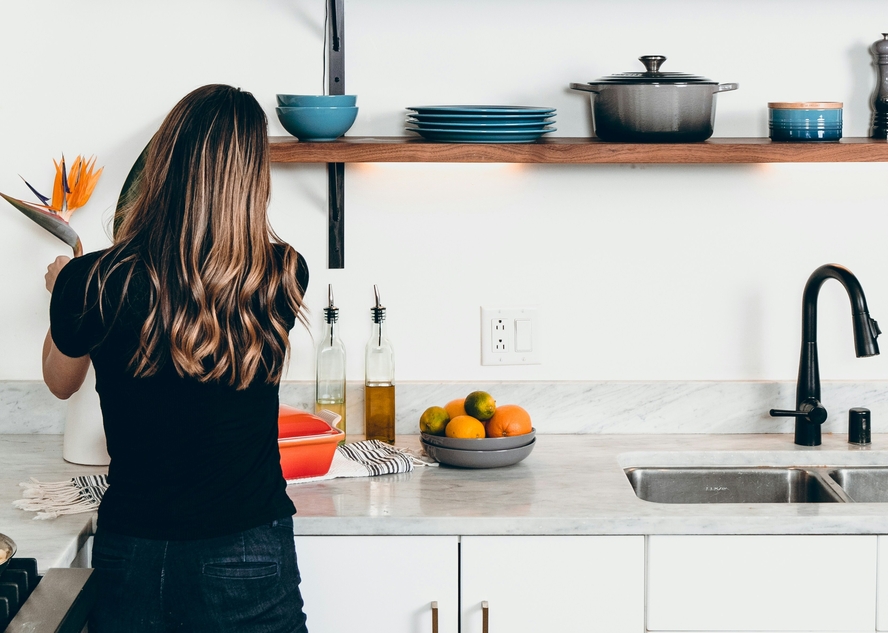
Using olive oil is also environmentally friendly. Every tablespoon of olive oil that you brush onto your nonstick skillet means fewer chemicals and propellants — which is what you’re putting into the environment when you use commercial sprays. Olive oil is also easy to clean off of your cookware with soap and water, leaving the nonstick surface of your pan intact and grease-free. You can use it in all different types of cookware, from a cast iron skillet to a ceramic pan. And if you’re worried about the smoke point, read about why you can stop worrying olive oil’s smoke point here.
How to Use Olive Oil to Grease a Skillet
Drizzle a teaspoon or two of olive oil into a hot skillet, then pick up the skillet and swirl the oil around. Watch as the oil heats up and becomes looser, allowing it to easily coat the entire pan.
If you’re really attached to the spraying method, you can also choose to put your olive oil in a hand pump spray bottle. This is a fantastic way to still spray your non-stick cookware to coat it evenly with oil, minus all that butane and propane nonsense.

Olive oil is one of the best alternatives for cooking spray, and we bet you already have some in your kitchen! Embrace this simple, tasty alternative and save your pans (and the environment). And if you’re looking for a recommendation on what brand of olive oil to use, here’s an article about one of our favorites.
Replace Nonstick Spray With Butter
Anthony Bourdain once said, “I like butter. I like a lot of butter.” We happen to agree with him on this. Butter and clarified butter, like ghee, is the answer to making a lot of foods taste incredible, and it is also a delicious alternative to terrible nonstick cooking sprays.
Greasing your pan with butter is a perfect substitute for cooking spray, and it has the bonus of adding richness and depth to your dishes. Butter doesn’t just prevent food from sticking — it also helps create a golden, flavorful crust that’s hard to beat.
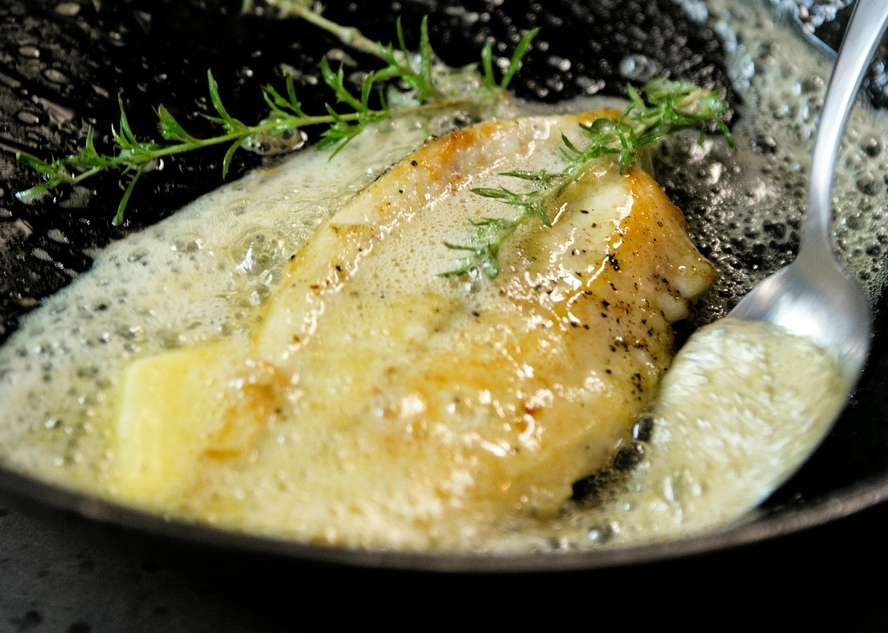
Butter is a natural ingredient without any of the chemicals often found in aerosol sprays, making it a safer and more wholesome choice. Plus, it will come right off your nonstick cookware with a little bit of dish soap and hot water.
How to Use Butter to Grease Your Cookware
Preheat your skillet on the stovetop, and then add a pad of butter. Swirl the pan around so the butter starts to melt and coats the entire bottom of the pan.
Whether you’re sautéing vegetables or searing a steak, butter elevates the taste and texture of your creations, turning everyday meals into indulgent treats. So next time you reach for that nonstick spray, check your fridge for butter instead — your taste buds and your cookware will thank you!
Use Parchment Paper Instead of Spraying Cooking Oil
Parchment paper is no longer just for baking! You can cook with it on the stovetop, too. Parchment paper is a fantastic, creative way to cook in a nonstick skillet with almost no mess. It’s also a health-conscious choice, as you can cook without adding extra fat to your foods.
Parchment paper is a naturally nonstick silicone-coated paper that’s perfect for preventing food from adhering to a skillet’s surface. The best part? Parchment paper is heat-resistant and safe for use up to relatively high temperatures, ensuring even cooking without burning.
Plus, cleanup is a breeze — just remove the paper and you’re done, leaving your skillet spotless. Your nonstick skillet will be preserved, clean, and ready to use again immediately!
How to Use Parchment Paper in Place of Nonstick Spray
Simply cut a piece to fit your skillet, place it on the bottom of your pan, and add your ingredients. Cook as normal, just without the added fat. Parchment is especially great for delicate items like fish or omelets, which can easily break apart when flipped.
This technique keeps your dishes light and fresh, allowing the natural flavors of your ingredients to shine through. Beyond being a perfect substitute for cooking spray, it’s a fantastic option for anyone looking to cut back on added oils and fats. Plus, parchment paper can often be reused or even composted, making it a great environmental choice.
However, there are a few safety measures you need to take when using parchment paper instead of cooking spray. First, make sure the paper is perfectly sized for your pan. Parchment paper is heat-resistant, but not flame-retardant — if any edges are hanging over the sides on your gas stovetop, they can easily catch on fire.
You should also keep in mind that parchment is typically only heat resistant up to around 425 degrees Fahrenheit, depending on the brand. If you’re frying food with parchment paper, make sure it’s something that only needs medium to medium-low heat. Any foods that require high temperatures would be better cooked with butter or olive oil.
Working With Nonstick Cookware
To get the longest lifespan out of your nonstick cookware, avoiding cooking spray is just one of many tips to keep in mind.
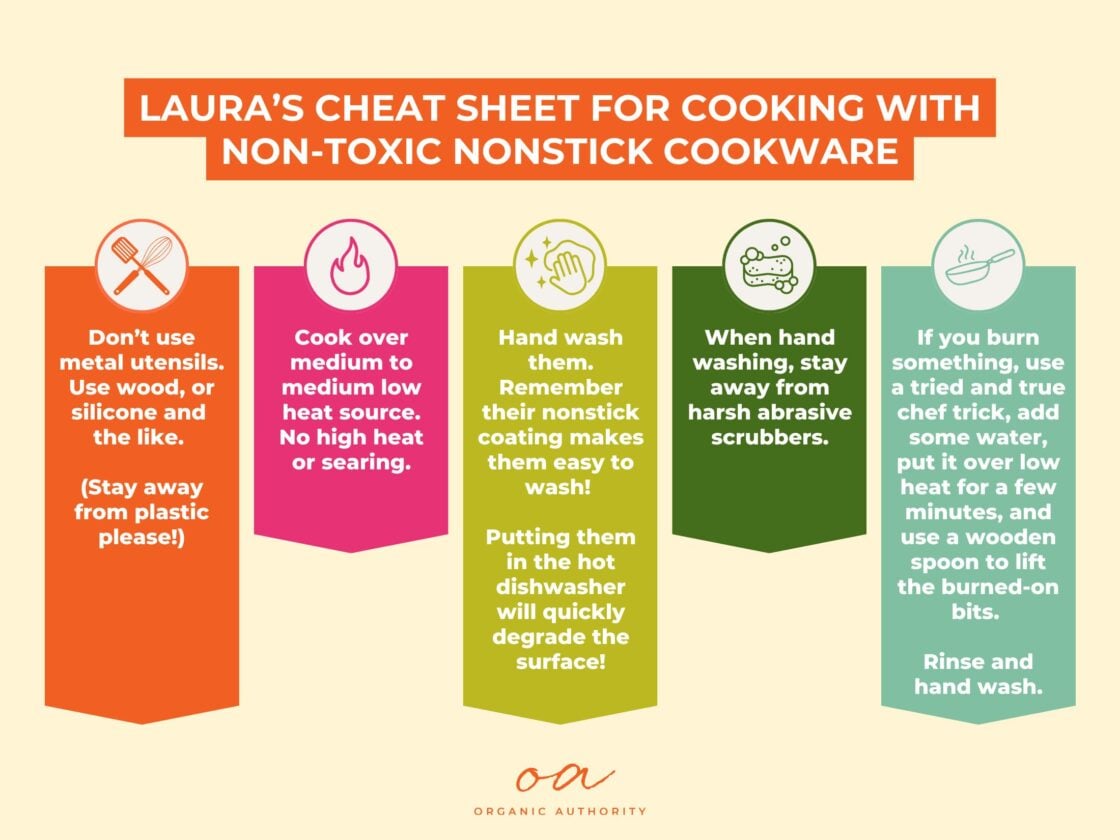
To protect your pan’s nonstick properties for as long as possible, be sure to avoid metal utensils, which can quickly scratch the nonstick coating. Wooden and silicone utensils are always the safer option. And stick to stainless steel when it comes to your high heat and searing! You’ll get the best performance out of your nonstick pans when used with a medium to medium-low heat.
The key to getting the most out of your nonstick pans isn’t just in how you cook with them, though — it’s also about how you clean them.
How to Clean a Nonstick Pan
If you’ve already used some nonstick spray on your cookware, make sure to get those pans clean before you start using an alternative for cooking spray.
To begin, wipe the pan with warm, soapy water and a soft sponge or cloth. Always avoid abrasive scrubbers or harsh chemicals that can scratch or degrade your cookware’s surface. If there’s any stubborn residue from your cooking spray, a good soak in hot, soapy water and some pressure from a wooden spoon should do the trick. Finally, dry your pan thoroughly to prevent water spots and maintain its sleek, nonstick performance.
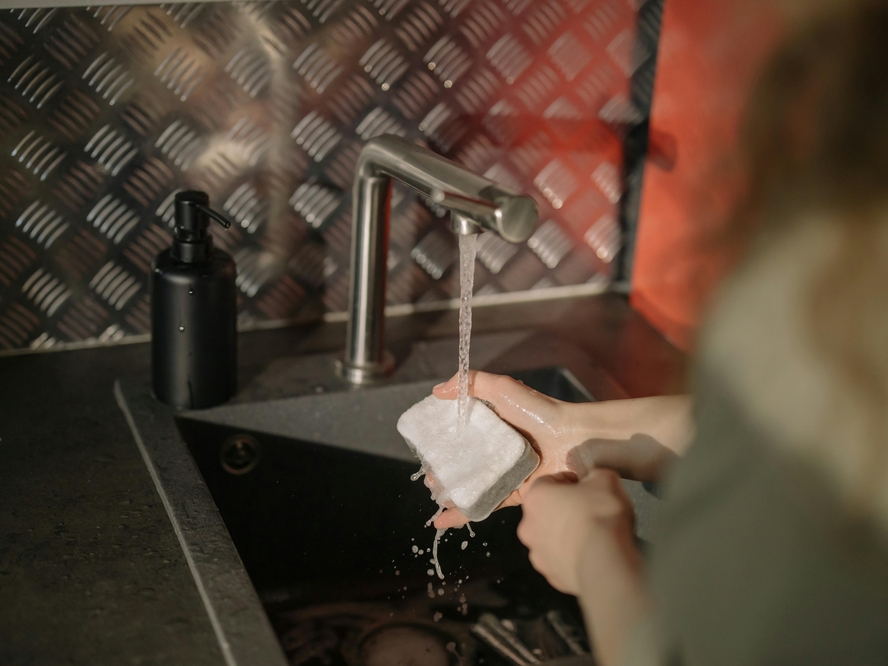
The next time you’re ready to cook, reach for the olive oil, butter, or parchment paper as a substitute for your can of cooking spray. And drop a comment below if you have a different substitute you like to use instead of cooking spray — we want to know!
P.S. Did you know? Organic Authority has its own nutrition and wellness shop to meet your needs and help you take control of your health. Shop clean supplements for energy, sleep, inner beauty for skin support, protein, workouts, pantry items and more. Shop The Organic Authority Shop now.
Read More on Organic Authority
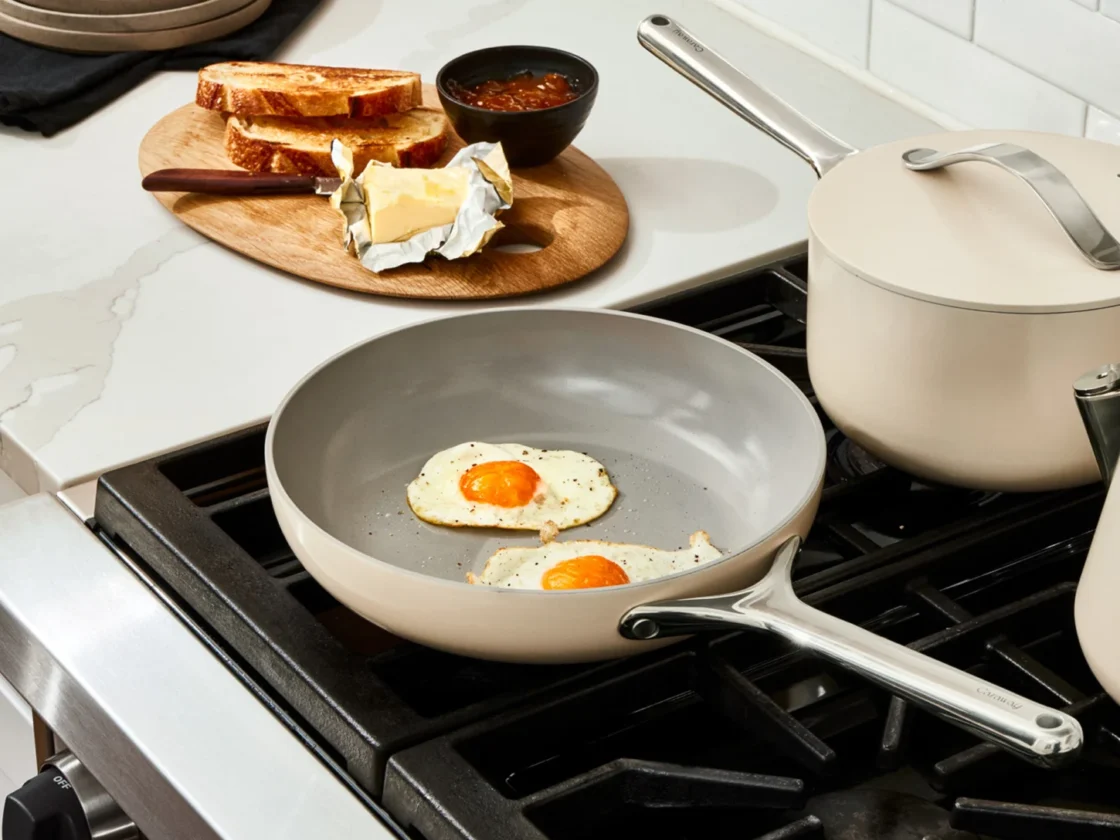
How to Prevent Eggs From Sticking (Fish, Too!) Without Sprays or Chemicals
7 Best Non-Toxic Cookware of 2024 [Chef Reviewed, Rated & Ranked]
My GreenPan Review After 10+ Years of Testing
Sources:
- https://www.healthline.com/nutrition/11-proven-benefits-of-olive-oil
- https://www.tasteofhome.com/collection/celebrity-chef-quotes-about-butter/

